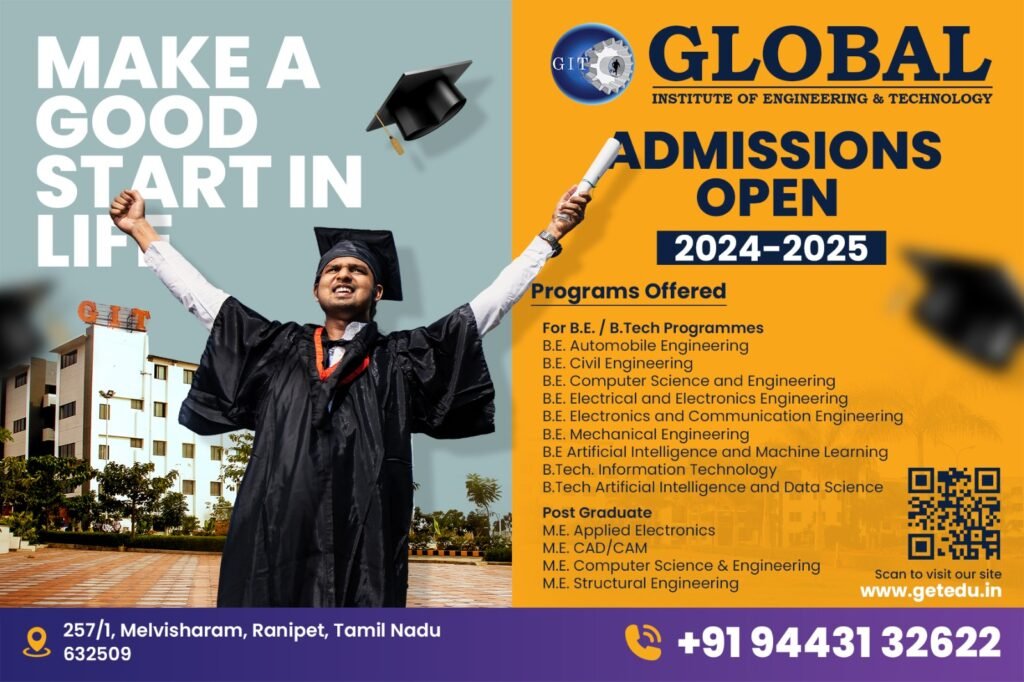About the department
The Automobile Engineering department was started in the year 2011 with the vision to impart quality education, skills and attributes based on changing global standards and automobile industrial requirement and hence emerge as centre for advance studies and research.
Ranipet Being the hub for various automotive MNC’s, to develop Industry-ready graduates, Automobile Engineering department of global institute of Engineering and technology is equipped with state of art infrastructure in classrooms, labs and library. To provide the students with in depth understanding of latest automobiles, automotive components laboratory consists of Conventional and modern auto components and vehicles. Sophisticated equipments such as TVS working model of fuel injection systems (MPFI and CRDI) have been utilized for providing hands on training for the students through workshops.
The department functions with experienced and well qualified faculty members. In addition to this the department provides the students with value added courses, workshops, seminars, guest lectures and Industrial visits to ignite the young minds and to trigger the sparks of automotive engineer with in them. State board higher secondary and CBSE equivalent students can join in the year one and Diploma holders can join under lateral entry scheme directly into second year.
To be a department of excellence in the domain of Automobile Engineering and develop component engineers imbibed with entrepreneurial and innovative skills with a concern for society.
- To provide accessible quality education well grounding the students in the fundamental principles of Automotive Engineering and human values.
- To provide conductive environment for the students to transforms themselves into professionals who can design, develop and effectuate automotive systems for industry and societal needs.
- To explore, develop and create innovations in automotive engineering thereby furthering research activities resulting in products satisfying industrial and social needs.
Excel in their professional career in automobile industry
Display research contribution with highest professional and ethical standards.
Apply the mathematical, scientific and engineering knowledge acquired in automobile engineering in growth of the industry.
Demonstrate professionalism and team work in their caree
Adapt to contemporary, technological and industrial trends by involving in life-long learning.
Engineering knowledge: Apply the knowledge of mathematics, science, engineering fundamentals, and an engineering specialization to the solution of complex engineering problems.
Problem analysis: Identify, formulate, review research literature, and analyze complex engineering problems reaching substantiated conclusions using first principles of mathematics, natural sciences, and engineering sciences.
Design/development of solutions: Design solutions for complex engineering problems and design system components or processes that meet the specified needs with appropriate consideration for the public health and safety, and the cultural, societal, and environmental considerations.
Conduct investigations of complex problems: Use research-based knowledge and research methods including design of experiments, analysis and interpretation of data, and synthesis of the information to provide valid conclusions.
Modern tool usage: Create, select, and apply appropriate techniques, resources, and modern engineering and IT tools including prediction and modeling to complex engineering activities with an understanding of the limitations.
The engineer and society: Apply reasoning informed by the contextual knowledge to assess societal, health, safety, legal and cultural issues and the consequent responsibilities relevant to the professional engineering practice.
Environment and sustainability: Understand the impact of the professional engineering solutions in societal and environmental contexts, and demonstrate the knowledge of, and need for sustainable development.
Ethics: Apply ethical principles and commit to professional ethics and responsibilities and norms of the engineering practice.
Individual and team work: Function effectively as an individual, and as a member or leader in diverse teams, and in multidisciplinary settings.
Communication: Communicate effectively on complex engineering activities with the engineering community and with society at large, such as, being able to comprehend and write effective reports and design documentation, make effective presentations, and give and receive clear instructions.
Project management and finance: Demonstrate knowledge and understanding of the engineering and management principles and apply these to one’s own work, as a member and leader in a team, to manage projects and in multidisciplinary environments.
Life-long learning: Recognize the need for, and have the preparation and ability to engage in independent and life-long learning in the broadest context of technological change.
The knowledge of humanities, basic sciences and management principles in the automobile industry.
The knowledge of engineering sciences in field of automobile engineering for the development of sustainable society.
The attitude of lifelong learning and ethical practices in their profession to assess societal, health, safety, legal and cultural issues.
The department has well exceptional research facilities with necessary computer systems with different software and equipments. Every research facility has satisfactory space according to the AICTE standards and furthermore meets every one of the necessities according to the Anna university standards.
Associated Laboratories:
- Strength of Materials and Fluid Mechanics and Machinery Laboratory
- Computer Aided Machine Drawing
- Automotive Components Laboratory
- Electronics and Microprocessors Laboratory
- Automotive Electrical and Electronics Laboratory
- Automotive Fuels and Lubricants Laboratory
- Computer Aided Engine and Chassis Design Laboratory
- Two and Three Wheelers Laboratory
- Engine Performance and Emission Testing Laboratory
- Vehicle Maintenance Laboratory\
| Name of the Department: B.E / AUTOMOBILE ENGINEERING(U.G) | ||
| Sl. No. | Name of the faculty member | Designation |
| 1 | Mr.V.VIJAYAKUMAR | HOD |
| 2 | Mr. P.RAJESH | Assistant Professor. |
| 3 | Mr.G.LOKESHWARAN | Assistant Professor. |
| 4 | Mr.S.MANIKANDAN | Assistant Professor. |
| 5 | Mr.S.MADHIVANAN | Assistant Professor. |

